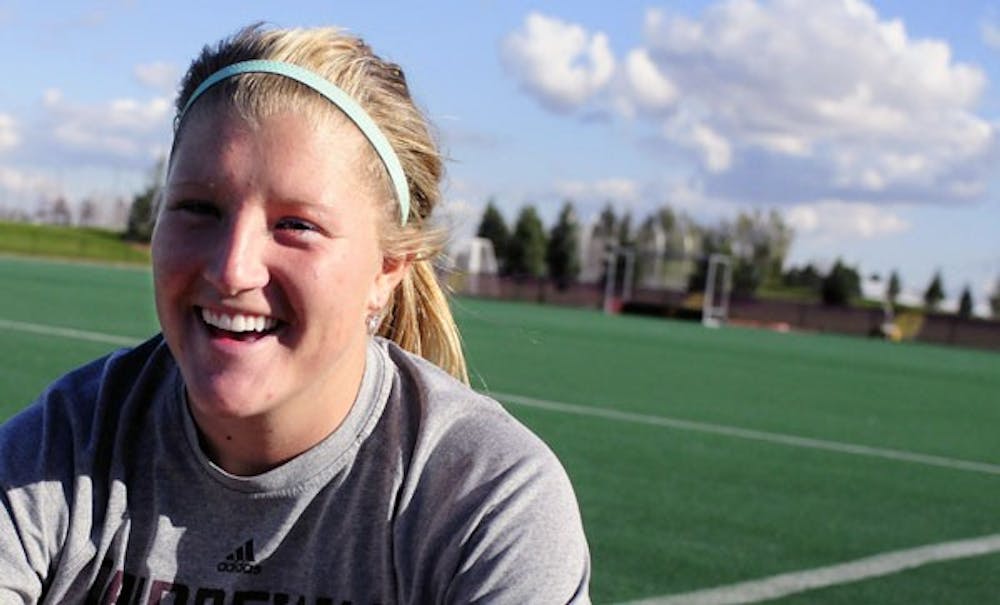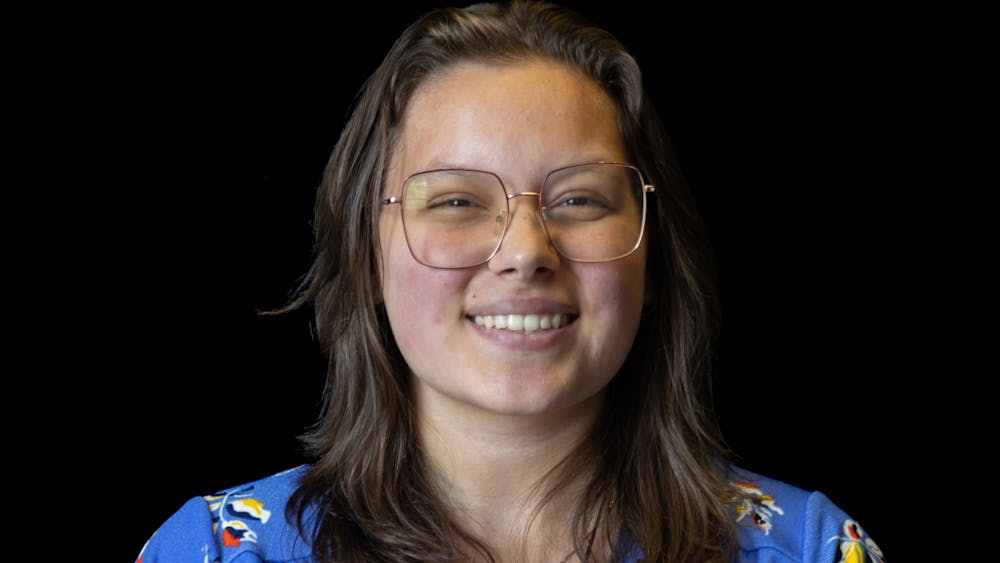Finding Answers: Field hockey's Amanda von Leer battles painful hereditary disease

Everyone knows the pain of a charlie horse — that temporary piercing pain you feel in your leg every now and then.
Well, imagine if it wasn’t temporary. Imagine dealing with that pain for hours at a time. Imagine it being part of your daily routine, and imagine persevering through the pain day in and day out to play a sport that you love.
Such is the case for field hockey senior captain Amanda von Leer.
“To be honest, it feels like someone is stabbing me with knives,” von Leer said.
In June of 2009, she was diagnosed with a hereditary disease known as mitochondrial myopathy, where the body’s mitochondria is not producing the energy required for the body’s muscles to function properly.
She takes a combination of 17 vitamins and a couple different medicines every day that she says takes a lot of the pain away. Even still, she fights through it.
“There are nights where I don’t sleep because of the pain I’m in, and sometimes even walking to class — it’s not that I can’t walk, but it’s painful,” she said. “But then there are also days where I wake up and I’m 100 percent.”
‘To the bottom of it’
During her freshman season, von Leer was sidelined with a stress fracture. She said she had a lot of pain in her legs and felt “very heavy.”
She visited an orthopedic doctor back in her home state of New Jersey, met with the training staff at Central Michigan and saw two different neurologists in New Jersey, but none of them found anything in X-rays and MRIs and simply dismissed it.
“The hardest part of her condition was getting to the bottom of it,” said Mandy Huggard, von Leer’s physical therapist. “It was a very challenging prognosis to make.”
Huggard was with von Leer through the whole process and works with her regularly over the summer to keep her in shape and in control of her condition.
Not being able to find out what was wrong with her made it really hard, and often times she felt like giving up.
“I didn’t understand why it was doing it, it was really painful, and I wasn’t sure if it was worth it,” von Leer said. “But my teammates kept me very strong and Cristy (Freese) was really encouraging.”
While watching the Major League Baseball playoffs in 2008 with her father, a new lead developed in the search von Leer’s diagnosis.
The TV commentator mentioned Rocco Baldelli, the Rays’ 2000 amateur draft selection. He made his debut in the 2003 season and was an early contender for the rookie of the year award, finishing the season with a .289 batting average, hitting 11 home runs, recording 78 RBI’s and stealing 27 bases.
In 2005, he suffered a torn ACL and hurt his elbow later in the season, an injury that required Tommy John surgery to repair.
Over the next two seasons, Baldelli also suffered from multiple hamstring injuries.
Doctors recommended he take some time off because of the injuries, forcing him to miss the 2008 and 2009 seasons.
“The commentator talked about how he was a great player, and how all of a sudden he had all these problems,” von Leer said. “Me and my dad were sitting there and thought, ‘Wow, that’s just like me.’”
Wanting answers
Von Leer turned to the University of Michigan Neuromuscular Clinic.
There, doctors did a muscle biopsy. Making a small incision, they snipped parts of the muscle out of her right thigh and diagnosed her.
“I went to U-M because they had a lot of specialists that have dealt with different, more advanced cases,” she said, “and I wanted an answer.”
Physicians told her the disease is hereditary and dormant until a major injury occurs.
“I’m involved in sports medicine, and it was mind numbing trying to figure out what was going on with her,” said her father, Bill von Leer. “The big thing was when she realized she wasn’t crazy. As an athlete, when you’re going through that, you start questioning yourself and whether something is actually wrong.”
She was told by the doctor, given all the pain, that she could still play, and her parents stood by her decision to go on.
But her father said they worried whether it would be detrimental to her health.
She contacted Baldelli’s physical therapist, Dr. Michael Reinold, who found interest in her story. He explained the concoction of vitamins, medicines and muscle supplements that Baldelli used to control some of his pain, allowing him to continue to play ball.
Thanks to his treatment, Baldelli was able to come back to the game he loves in 2010, where he currently plays as a designated hitter and reserve outfielder for the Rays.
“His story motivated me,” von Leer said. “If someone like that could keep going, I knew I could.”
Coping
While her condition makes it hard to run with the team at practice, von Leer considers herself in the same condition as the rest of her team. Off the field, she spends a lot of time working with the staff swimming and riding bikes and the elliptical.
“The symptoms I’m having, I will always have, but playing won’t make it any worse,” von Leer said.
On the field, CMU head coach Cristy Freese has moved her to different positions to see where she has the most success.
“Last year, she played more offensively and this year we’re playing her at sweeper,” Freese said. “Physically, it’s not as demanding on her and she’s able to play more.”
Playing in six games of her senior season, von Leer has started four of them. She was a nominee for Mid-American Conference Field Hockey Player of the Week following the team’s 2-1 victory against Saint Louis on Sept. 19, a game in which she scored the game-winning goal in the closing minutes of the contest.
“Obviously the fact that she was chosen as a captain shows the team understands,” Freese said. “She has a good personality for captain. She’s vocal and has a lot of confidence and that’s good.”
The fight
Today, there is no cure for mitochondrial myopathy, but there is hope that someday it will be treatable.
“There are people from my area with the disease that sometimes have problems waking up in the morning,” von Leer said, “and they can’t open their eyes because their muscles aren’t functioning correctly.”
The United Mitochondrial Disease Foundation is one of the most common groups that helps educate and promote research on mitochondrial disorders. The group sets up Energy for Life Walk-a-thons to raise awareness.
Back home in Marlton, N.J., von Leer wants to tell her story and be active in spreading the word about the disease.
“A lot of times people deal with this condition and don’t know what it is,” Huggard said. “Their bodies break down without getting the proper treatment.”
Regarding von Leer, Huggard added, “She’s a great kid. We love her, and we’re so proud of her for sticking with it and getting through it.”




